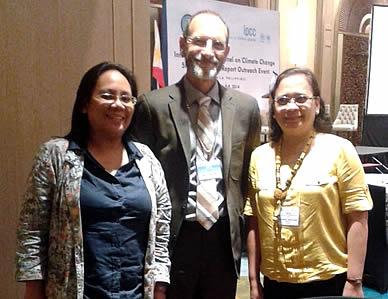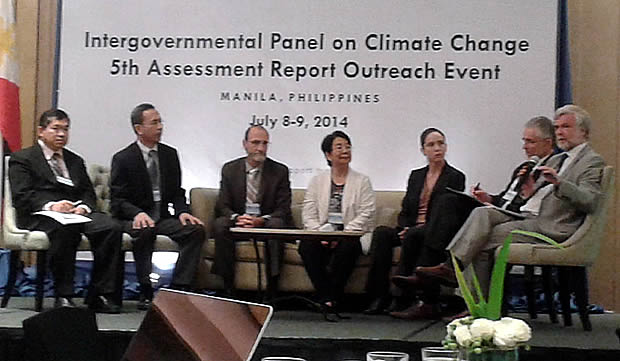The IPCC, established by the United Nations Environment Programme and the World Meteorological Organization (WMO), is the leading international scientific body tasked to review and assess the most recent scientific, technical, and socio-economic information produced globally that are relevant to the understanding of climate change. Since 1990, the IPCC has already released four (4) assessment reports on climate change prepared by three working groups focusing on three key aspects: the physical science of climate change (Working Group I); impacts, adaptation, and vulnerability (Working Group II); and mitigation strategies (Working Group III). The respective reports of Working Groups I, II, and III for the AR5 alone were written based on the contributions of 831 Coordinating Lead Authors (CLAs), Lead Authors (LAs) and Review Editors (REs). The IPCC likewise enlisted the help of thousands of experts who were carefully selected based on their publications and works on climate change.
Secretary Mary Ann Lucille L. Sering, Vice-Chair of the Philippines Climate Change Commission, said in her welcome remarks that the IPCC, in its AR5, concluded with 95 percent certainty that human activities are the main cause of accelerated global warming. She added that the Philippine Government, although not a major emitter of carbon and other gases, has started to embark on low emission development strategies to help reduce greenhouse gas emissions and to enhance efforts aimed at reducing the extent of global warming. On the other hand, Prof. Jean-Pascal van Ypersele, Vice-Chair, IPCC, recognized the substantial contribution made by hundreds of scientists and experts as well as the cooperation of the world’s governments to make the publication of AR5 possible. According to Prof. van Ypersele, AR5 contains five (5) key messages, as follows: (1) Climate change is unequivocal; (2) Climate change is occurring as a result of human activities; (3) Climate change is already having significant impacts on species and ecosystems, human health, well-being and security, food security and food productions systems such that there is a need to reduce the severity of these impacts; (4) There is a need to step up actions to reduce greenhouse gas emissions; and (5) There are available solutions, however, climate change mitigation is a global problem that requires international cooperation. Prof. van Ypersele hopes that after the outreach event, the Philippines will have a better grasp of the IPCC AR5 to come up with better policies in the future.
The key findings as contained in the AR5 were presented and discussed by the authors themselves, namely: Dr. David Wratt, Chief Scientist (Climate), National Institute of Water and Atmospheric Research, New Zealand and Vice-Chair of the IPCC Working Group I; Prof. Christopher B. Field, Director, Department of Global Ecology, Carnegie Institute for Science and Co-Chair of the IPCC Working Group II; Dr. Katherine J. Mach, Co-Director of Science for the IPCC Working Group II Technical Support Unit; Dr. Rosa Perez, Senior Research Fellow, Manila Observatory and Review Editor, Impacts, Adaptation and Vulnerability; Dr. Juan M. Pulhin, Dean, College of Forestry and Natural Resources and Coordinating Lead Author, Chapter 12-Human Security, Impacts, Adaptation and Vulnerability; Dr. Rodel D. Lasco, Country Director, World Agroforestry Center and Lead Author, Chapter 24-Asia, Impacts, Adaptation and Vulnerability; and Prof. Jim Skea, Faculty of Natural Sciences, Centre for Environmental Policy, Imperial College, London and Vice-Chair of IPCC Working Group III.
The AR5 Outreach Event was also highlighted by two parallel sessions – the Science Dialogue and the Policy Dialogue. In the Science Dialogue, Prof. van Ypersele discussed the procedures for the preparation, review, acceptance, adoption, approval and publication of IPCC Reports including the scoping process, nomination process and selection of authors, preparation of drafts by the writing teams, the review by experts and governments and finally the approval, adoption and acceptance process in plenary sessions. It was also during this parallel session that local climate experts led by Dr. Lasco presented the initial draft of the Philippine Climate Change Assessment (PhilCCA). PhilCCA is an initiative of the CCC together with its National Panel of Technical Experts and the Oscar M. Lopez (OML) Center to come up with an assessment report (similar to the three working groups of IPCC) on Climate Science, Adaptation and Mitigation Studies in the Philippines.
 The panel of experts for the parallel session on Policy Dialogue was led by Secretary Sering together with Ms. Thelma Cinco of the Philippine Atmospheric Geophysical and Astronomical Services Administration (PAGASA) and Dr. Katherine Mach. This session presented climate scenarios in the Philippines including its impacts. Current policies and initiatives to address change particularly climate change adaptation and disaster risk reduction were also presented.
The panel of experts for the parallel session on Policy Dialogue was led by Secretary Sering together with Ms. Thelma Cinco of the Philippine Atmospheric Geophysical and Astronomical Services Administration (PAGASA) and Dr. Katherine Mach. This session presented climate scenarios in the Philippines including its impacts. Current policies and initiatives to address change particularly climate change adaptation and disaster risk reduction were also presented.
Ms. Carmen Nyhria G. Rogel and Mr. Henry M. Custodio, Program Specialists, and Ms. Pilipinas M. Luis, Research Assistant, all from the Research and Development Department, together with Ms. Rosario B. Bantayan, Program Specialist, KMD-Training Unit, attended the IPCC AR5 Outreach Event.
